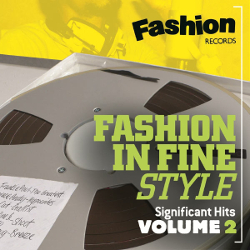Articles about reggae music, reviews, interviews, reports and more...
Fashion In Fine Style - Significant Hits Volume 2

Fashion In Fine Style - Significant Hits Volume 2
A worthy companion to volume 1 showing the dizzying diversity of Fashion's output.
Sampler
In 2011 when London’s final Dub Vendor shop closed, owner John McGillivray and his friend Chris Lane decided to reissue their fondly remembered Fashion imprint. Their second Significant Hits compilation continues in a broadly similar vein to the first, showing the dizzying diversity of their output.
 From 1980 until 2000 Fashion Records followed a formula. John’s pre-release chart and what sold in store informed engineer Chris’s musical activities to create a slew of home-grown successes. Unlike non Jamaican reggae fans today, they were never partial. As the name suggested, whatever was in vogue – roots, dancehall or lovers, singer or deejay, even jungle - they lovingly laid and cut it in their A Class studio.
From 1980 until 2000 Fashion Records followed a formula. John’s pre-release chart and what sold in store informed engineer Chris’s musical activities to create a slew of home-grown successes. Unlike non Jamaican reggae fans today, they were never partial. As the name suggested, whatever was in vogue – roots, dancehall or lovers, singer or deejay, even jungle - they lovingly laid and cut it in their A Class studio.
Where Volume 1 began with their first hit, Dee Sharp’s do-over of Leo Hall’s 1975 falsetto request Let’s Dub It Up, Volume 2 has Johnny Clarke challenging soundboys on the same rhythm with Rocking To The A Class Champion. McGillivray’s idea to give Dub It Up the horn line from Prince Lincoln’s Humanity is augmented further with the piano motif from Bunny Lee’s My Conversation - meshing two classic melodies as one.
Volume 1 had Alton Ellis singing romance on Play It Cool. On Volume 2 Janet Lee-Davis asks Do You Remember over Fashion’s recreation of one of Ellis’ finest rhythms, Randy’s cover of the Cornelius Brother’s It’s Too Late. Roots music on Volume 1 was represented by Guidance from St Lucian born singer Nereus Joseph. On Volume 2 he is back complaining of a Sensi Crisis on a blazing lick of the Tickle Me backing that suggests it was not as scarce as he says.
Volume 1 included Jamaican deejays Cutty Ranks and Joseph Cotton and UK MCs such as Tippa Irie. The follow-up has Papa San’s 9 minute spoken history DJ Business. The lyric – spanning U-Roy to singjay – was a sound tapes favourite John and Chris requested San recite over a sequenced pattern by Cleveland “Clevie” Browne.
And where the increasingly unfashionable vocal free sounds had their place on part 1 with Dub Organiser, the sequel includes the melodica piece Detrimental Music by Glen Brown. Given that the title of the series is Significant Hits and Chris describes its source LP Plays Music From The East as “Critically acclaimed rather than a big seller” its inclusion is a welcome surprise.
The kind of person who will be excited by Glen Brown will probably find the presence of pop reggae covers of Lulu’s Shout by Louchie Lou and Michie One and Frankie Lymon’s Why Do Fools by Phillip Cleo and CJ Lewis “too commercial” or “too soft”. But again the title is Significant Hits and Shout charted nationally - no mean feat when even now a pop artist can succeed trying reggae, yet reggae artists rarely cross into pop. The sticklers for harder fare miss the Fashion ethos and often unwittingly do the segregationist music industry’s bidding.
Likewise the purist who enjoys Starkey Banton’s anti jungle chat Jungle a Bungle on Volume 1 may be less enamoured with Tenor Fly’s response Don’t Diss the Jungle. But both make points of historical importance to anyone interested in sonic culture. Banton criticises the 90s craze for bringing drugs to dances and causing a migration of MCs to the faster beat. Fly responds that jungle (in its infant stages a kind of reggae) was, like lovers rock, a British phenomenon, of which dedicated followers of Fashion could be proud.
Known perfectionist Lane’s soft, precise production is everywhere, from early, instrument ensembles featuring the Massive Horns (Annie Whitehead, Tim Sanders and Barbara Snow) to digital works decorated with just his guitar. The promo is missing one track by Barry Boom. Making Love is played by Fashion allies Mafia and Fluxy with an intro borrowed from the rare groove tune of the same name. The major omission on both sets is the late Smiley Culture but perhaps this will be remedied by part 3.
With the slight increase in poppy cuts balanced with the Glen Brown insertion this is a worthy companion to volume 1. And if you listen between the grooves it’s as replete with UK reggae history as an interview with Lane himself.
Read more about this topic
Comments actually desactivated due to too much spams
Browse by categories
Recommended Articles
Latest articles
Recently addedView all
© 2007-2026 United Reggae. All Rights Reserved. Reproduction in whole or in part is prohibited. Read about copyright
Terms of use | About us | Contact us | Authors | Newsletter | A-Z














